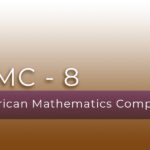India National Olympiad 2018 Problems
Problem 1
Let $ABC$ be a non-equilateral triangle with integer sides. Let $D$ and $E$ be respectively the mid-points of $BC$ and $CA$ ; let $G$ be the centroid of $\Delta{ABC}$. Suppose, $D$, $C$, $E$, $G$ are concyclic. Find the least possible perimeter of $\Delta{ABC}$.
Problem 2
For any natural number $n$, consider a $1\times n$ rectangular board made up of $n$ unit squares. This is covered by $3$ types of tiles : $1\times 1$ red tile, $1\times 1$ green tile and $1\times 2$ domino. (For example, we can have $5$ types of tiling when $n=2$ : red-red ; red-green ; green-red ; green-green ; and blue.) Let $t_n$ denote the number of ways of covering $1\times n$ rectangular board by these $3$ types of tiles. Prove that, $t_n$ divides $t_{2n+1}$.
Problem 3
Let $\Gamma_1$ and $\Gamma_2$ be two circles with respective centres $O_1$ and $O_2$ intersecting in two distinct points $A$ and $B$ such that $\angle{O_1AO_2}$ is an obtuse angle. Let the circumcircle of $\Delta{O_1AO_2}$ intersect $\Gamma_1$ and $\Gamma_2$ respectively in points $C (\neq A)$ and $D (\neq A)$. Let the line $CB$ intersect $\Gamma_2$ in $E$ ; let the line $DB$ intersect $\Gamma_1$ in $F$. Prove that, the points $C, D, E, F$ are concyclic.
Problem 4
Find all polynomials with real coefficients $P(x)$ such that $P(x^2+x+1)$ divides $P(x^3-1)$.
Problem 5
There are $n\ge 3$ girls in a class sitting around a circular table, each having some apples with her. Every time the teacher notices a girl having more apples than both of her neighbours combined, the teacher takes away one apple from that girl and gives one apple each to her neighbours. Prove that, this process stops after a finite number of steps.
(Assume that, the teacher has an abundant supply of apples.) .
Problem 6
Let $\mathbb N$ denote set of all natural numbers and let $f:\mathbb{N}\to\mathbb{N}$ be a function such that
$\text{(a)} f(mn)=f(m).f(n)$ for all $m,n \in\mathbb{N}$;
$\text{(b)} m+n$ divides $f(m)+f(n)$ for all $m,n\in \mathbb N$.
Prove that, there exists an odd natural number $k$ such that $f(n)= n^k$ for all $n$ in $\mathbb{N}$.




